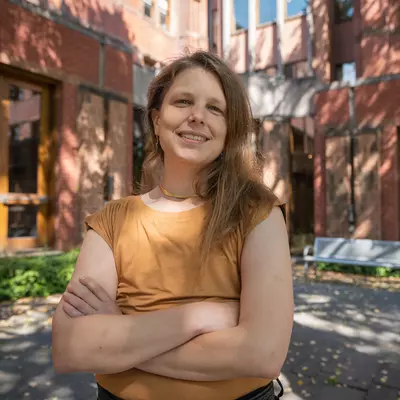
The Borg Queen on Skid Row: The Spatial Politics of Filming Location in the Third Age of Star Trek
October 16, 2024 | 4:00PM - 6:00PM
|
In-person
Room 208N,1 Devonshire Place, Toronto, ON, M5S 3K7
Downtown Los Angeles has long been the object and setting of dystopian, often racist and classist, fantasy for Hollywood science fiction. Perhaps responding to this trend, the Star Trek transmedia franchise, noted for its persistent attachment to utopia, has historically been reticent to make downtown L.A. a diegetic setting. This aversion was finally overcome by Star Trek: Picard, which in 2022 aired an entire season principally set on the edge of Skid Row – long a site of deprivation and confinement, but also solidarity and resistance, for unhoused Angelenos.
Science fiction criticism has frequently noted the contradiction between Star Trek’s imagined postcapitalist future and its capitalist conditions of production and consumption and nebulous accounts of the struggles that might realize such a utopia. This dynamic has, in some ways, only been exacerbated by the contemporary, financialized entertainment industry’s growing preoccupation with preexisting intellectual property, which has led to a contemporary “third age” of proliferating new Trek.
This talk seeks to add geographical specificity and complexity to such critiques by grounding both the production and the narrative of Picard’s second season in local racial-capitalist dynamics and struggles over urban space. It experiments with two approaches – Curtis Marez’s “streaming in reverse” and Celestino Deleyto’s notion of “looking for the city” – to investigate Picard’s material and televisual use of a particular crossroads in downtown LA on the northwest side of contemporary Skid Row. Both televisually and materially, the city teems with contradictions, excesses, and possibilities that fans and scholars might more fully and self-critically “engage.”
David K. Seitz is a critical geographer of liberal multiculturalism with recurring interests in gentrification, immigration, queer community formation, popular culture, and socialist strategy. He is the author of two books, A Different Trek: Radical Geographies of Deep Space Nine and A House of Prayer for All People: Contesting Citizenship in a Queer Church. Seitz is associate professor of cultural geography in the Department of Humanities, Social Sciences, and the Arts at Harvey Mudd College in Claremont, California. He is affiliated faculty in the Cultural Studies Department at Claremont Graduate University, and core faculty in the American Studies Program at the Claremont Colleges. In 2023, he joined the editorial collective of ACME: An International Journal for Critical Geographies. He lives in Los Angeles.
Organized by the Centre for the Study of the United States, Munk School of Global Affairs & Public Policy at the University of Toronto. This event is supported by the School of Cities, the Cinema Studies Institute and the Deparment of Geography and Planning, University of Toronto.

